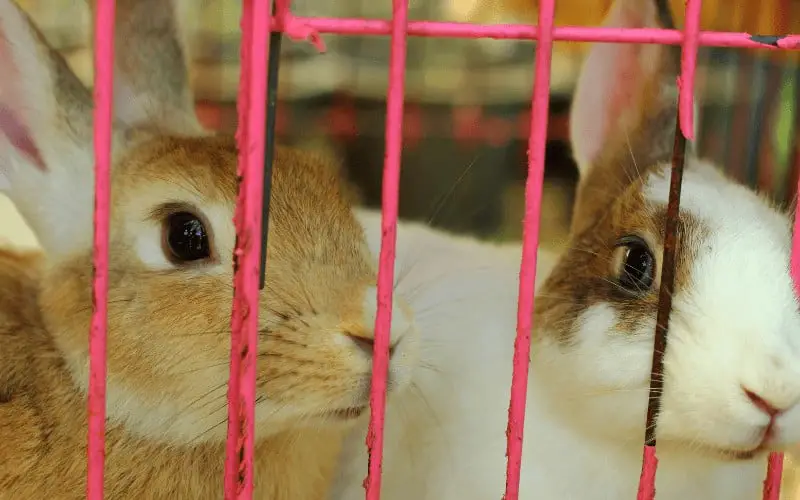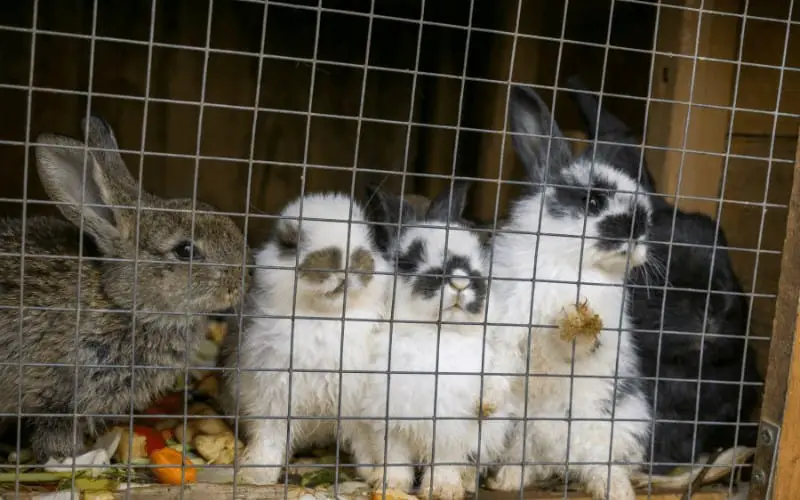Whether you already have a pet rabbit or you’re thinking of getting one, knowing the lifespan of a rabbit in captivity will help you give your pet the best life possible.
Larger rabbit breeds generally have a shorter lifespan than dwarf breeds, and purebred bunnies have a shorter lifespan than mixed breeds. It is, however, worth noting that rabbits come in different species with different lifespans.
A mixed-breed dwarf rabbit can live for 8 years, while a giant purebred may live up to 10 years.
What is The Lifespan of a Rabbit In Captivity?
There are many factors that determine the lifespan of a rabbit in captivity. Factors such as gender, breed, and environment can all have an effect on how long your furry friend will live.
The average lifespan of rabbits is between 8 to 12 years, but this varies depending on their living conditions – so it’s essential to ensure they’re happy!
How Long Do Rabbits Live For As A Pet?
On average, rabbits live for about 12 years. However, this lifespan can vary depending on the circumstances of care and environment.
Here are some ways to help keep your rabbit healthy:
- Provide a fresh supply of food daily
- Make sure hay is always available as a source of nutrition
- Keep living space clean with regular litter changes
Factors That Determine Rabbits Lifespan

Apparently, there are many factors that determine the lifespan of a rabbit, as mentioned earlier.
Some of these factors include:
1. Diet
Feeding your rabbits with a balanced diet will significantly help to prolong their lifespan. It is crucial to provide a diet that contains the right mix of fiber, protein, and fat.
A high-fiber diet will help keep the gut healthy by providing roughage to absorb water from fecal matter.
The food should be rich in omega fatty acids, which help maintain fluid balance throughout body tissues during stressful events.
A high protein diet will ensure there are enough amino acids to produce new cells and repair tissues, while a low-fat diet allows the liver to use fat for energy so it can function at its best.
Since rabbits tend to be picky eaters, sometimes adding supplements like minerals or vitamins may help boost their overall health.
In our experience, rabbits on a high-fiber diet will live an average lifespan of 12 years and up to 18 years with the proper care in captivity.
2. Living conditions
Living conditions can have a significant impact on the lifespan of rabbits. The most common living condition is caged life, which could be an issue for a rabbit’s health.
In captivity, it’s rare to see wild animals because they would not survive in their natural habitats very long. Rabbits require open space as well as the ability to hide and escape.
Rabbits are creatures of habit, which means they like their surroundings routine. This is important for the rabbit’s mental health because it helps them know what to expect in life.
It’s also not easy being a caged animal since this may result in only one hour outside per day. These animals are more prone to illnesses such as kidney disease, respiratory infections, and ulcerative pododermatitis.
Rabbits who live in captivity may only have an average lifespan of 2 years or less because they don’t get the exercise they need. The other issue is that there’s not enough space for them to explore and move around.
3. Genetics
Genetics also plays a vital role in how long rabbits will survive because it dictates certain physical characteristics such as body size.
There are two types of genes: dominant and recessive. The expression of dominant genes is the typical outcome.
Still, if a rabbit has recessive gene inheritance, then it will be more likely to exhibit traits that have been suppressed by strong dominant genes in its lineage — such as a shorter lifespan.
The evidence suggests that rabbits’ short lifespan is due to the expression of their dominant genes.
The average lifespan for domesticated pet rabbits is five years but can live up to 15 if left in the wild, and there are two types of genes in rabbits that affect lifespan.
4. Personality traits
Rabbits are social creatures who enjoy close relationships. If they feel alone or ignored, their stress levels increase, and they develop diseases such as heart disease, arthritis, lower respiratory infections, and obesity.
One study found that rabbits living with others have a longer life span than those raised in isolation. Rabbits also get lonely when they are not provided with toys to chew on or given enough opportunities to explore.
Aside from their lifespan, rabbits’ personalities also affect the way they interact with humans and other animals.
Rabbits who have a strong sense of self-preservation tend to be less trusting than those without as much drive for survival.
Rabbits that tend to be aggressive or shy are more social with other animals, while those that are bossy and dominant tend to have a more challenging time interacting with others.
The way in which an individual rabbit interacts with humans can also affect their lifespan. Rabbits who enjoy being groomed regularly live longer than those who resist human contact.
When rabbits are not given the opportunity to explore and are provided with toys to chew on, their lifespan is also increased.
5. Breed
Different breeds of rabbits have different lifespans. An article by the BBC (Link) found that Dwarf Rabbits live for around five and a half years on average, while Larger Breeds can reach up to ten or twelve years old.
Dwarf breeds may live shorter lives due to “a more sedentary lifestyle and a genetic predisposition for developing tumors.”
Larger breeds may live longer because they have a higher resting metabolic rate, meaning that while the smaller breed is sleeping through the day, their larger counterparts are active.
Dwarf Rabbits also experience greater cardiovascular stress than Larger Breeds.
Breed can also affect lifespan based on the environment of captivity. BBC found that a “dwarf rabbit living in an enriched enclosure with other rabbits, toys and lots of space might live for more than six years.”
This is longer than the average lifespan because they have been able to exercise freely due to their shared cage with other rabbits.
Can Rabbits Live 20 Years?
The lifespan of a rabbit in captivity is not always apparent. Rabbits can live for up to 20 years, but their life expectancy depends on the animal’s size and diet.
The average lifespan might be nearer 12-15 years if your pet bunny has an unhealthy diet or lives in cramped quarters that don’t allow it to move around much.
You may also like:
- How Much Lettuce Should I Feed My Rabbit?
- How Often Should I Feed My Bunny?
- Can Coyotes Be Domesticated?
- Can Hamsters Eat Nectarines?
Conclusion
The lifespan of a rabbit in captivity can depend on various factors, including breed size, genetics, diet, etc.
The life expectancy for a rabbit in captivity is usually less than the lifespan of one who lives freely outside because they are not able to exercise as much and do not have access to proper nutrition or medical care if needed.
